#i used to think i wanted to read the marlowe plays in the order (presumed to be chronological) presented in my penguin copy of his plays
Text
i read doctor faustus by christopher marlowe in one day. it's been on my to-read list for like six years and i read it in one day.
#i didnt realize how short a play it was#not counting appendices i didnt read those yet. there's about 10 pages of that in my copy#ill read those later#perhaps i shouldve read it yesterday. it'd be more friday the thirteenth-y#well i enjoyed that#tales from diana#i used to think i wanted to read the marlowe plays in the order (presumed to be chronological) presented in my penguin copy of his plays#but i decided not to#thats probably why it took me so long#i hadnt read a marlowe play since i finished tamburlaine the great part 1... in 2019#i was never motivated to read part 2 lol
2 notes
·
View notes
Note
Hi! Non-native speaker, so I hope my English is not that bad. I really like your blog and especially your analyses on Mephisto. Fantastic!(read in his voice)
So my question.Have you read blue exorcist novel Bloody Fairy Tail? In the novel there is a part where little girl describes Mephisto as big void and the black wing towering over him. Do you think this could be a hint to his real form? Or perhaps his role as Angel of Death? Also there is part in the first chapters of the manga, when Mephisto meets with Amaimon and tells him that he took Rin under his wing. It might be just a translation though. Sorry for a long ask
After accidentally deleting this twice I’m going to try again! (New phone, still getting used to it)
I have not actually read the entire thing because finding any of the light novels in the US is really, really hard. Like, really hard. But I have actually read the part you’re talking about through fan pages here on Tumblr talking about that very thing! (And thanks to @facets-and-rainbows I’ve now been able to read more! Thank you.)
Here’s the thing: the only image that exists that depicts Mephistopheles in his pre-Goethe form is this one by Eugene Delacroix from the early 1800’s:
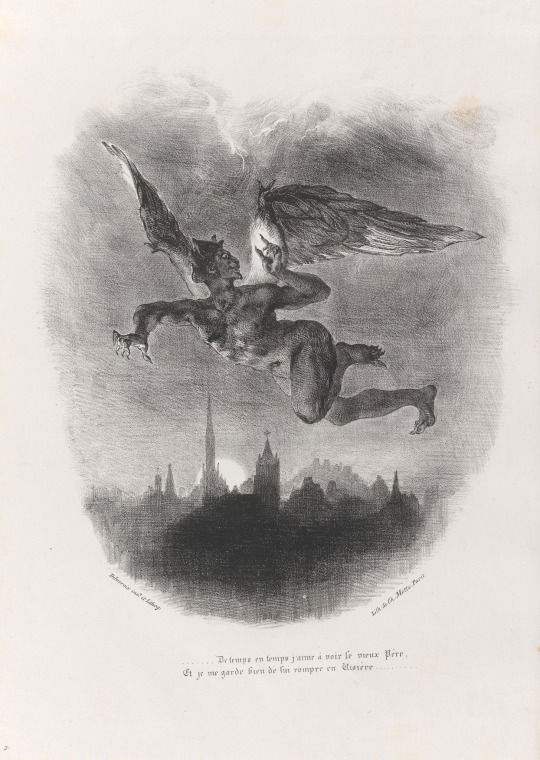
This version of Mephistopheles is from Marlowe’s 1616 version, The Tragical History of the Life and Death of Doctor Faustus. In it, (the B version) Mephistopheles is said to conjure wings in order to frighten the knights attacking him and Faustus, before turning said knights into demons (or animals in some translations) and giving them horns.
Mephistopheles is also a fallen angel, and uses that to both dissuade Faustus from forming a contract at the beginning, and later to help trick and torment the Pope in this version.
The inscription on it reads: De temps en temps j’aime a’voir le vieux Pére, Et me garde bien lui rompre en Visiére
Which roughly translates to (keeping in mind I’m still learning how to read older dialects of French) : “From time to time I like to see my old/winterly/ancient Father, and take care not to break off/sever with him in Person.” The caption probably is talking about the Pope scene, or maybe Faustsus’ separation from God, but to me it also speaks to the retribution of both.
Aaaaaanyway point is, it’s very popular to depict Mephistopheles as having black, feathery wings, partly because no matter what version he’s in he’s still a fallen angel lamenting his separation from God, (which isn’t especially relevant but it IS interesting) and also because the wings are mentioned directly in the earliest published version of the play.
What’s more, the original Mephistopheles from the late 1500’s (earliest record of the name was 1587) in the original Faustbuch was never a demon at all, but rather either an angel or a man that had been damned to serve Lucifer for all eternity by selling him his own soul, the reasons for which are never revealed. He does, however, from the very beginning, warn Faust about what he’s doing, and what that will lead to, presumably because he’s done the same thing and now regrets it. Fun stuff :)
As to whether I think it has anything to do with his true form, I would say yes, to a point. Samael is a shape-shifter after all, so not too many forms are out of bounds.
However, if he has wings (probable or at least possible) there’s some kind of reason why he doesn’t use them.
These are the closest we ever see to a demon form for him, and he’s… pretty formless, broadly speaking.
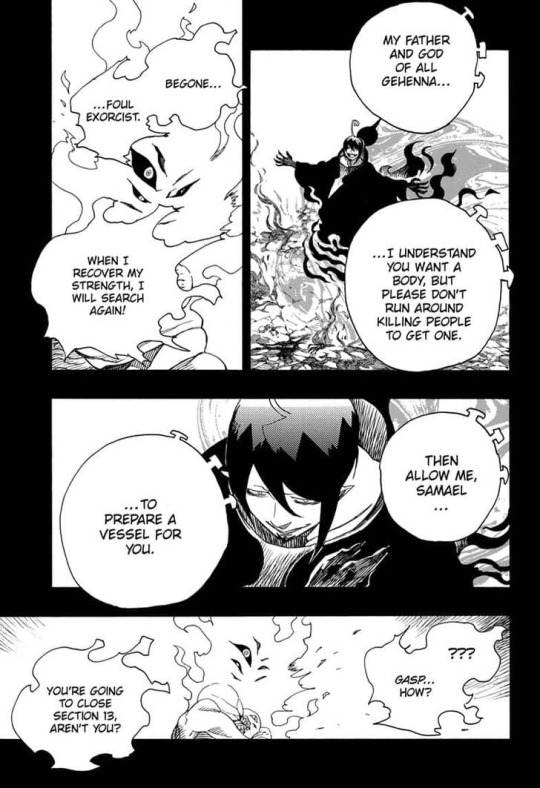
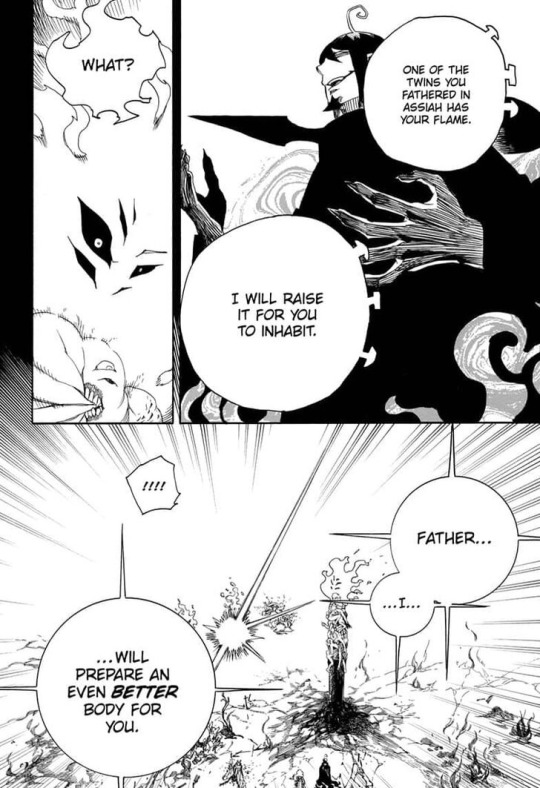
He is kind of void-like, true, and warps the space around him. But, no visible wings.
In fact the only wings we see him with are not his own - they’re that of his familiar, which is likely Kin of Azazel.
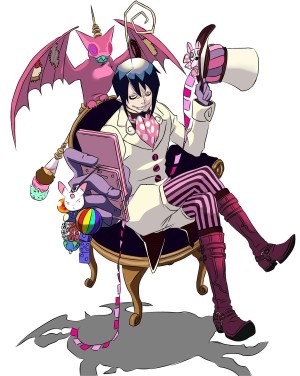
He can fly without any wings at all, (space timey levitation and all) so one would question why he’d need a familiar’s, never mind his own. Conservation of energy perhaps?
In any case I do think he CAN have wings, when he wants them, if that makes sense. Shape shifting is however tiresome, and flight requires a great deal of energy expenditure even if he’s not working against gravity in the traditional sense. So I imagine that he could use his own wings, or turn into a bird, but he doesn’t do so unless practical because it eats up his stamina, which he’s got little of comparatively.
Though honestly I’m more of the mind that he does shape shift all the time to observe things, (and what better form than a bird? He’s called The Raven too to boot) it’s just that turning into anything like that is going to terrify people, and unless that’s his aim, it’s not terribly reasonable. Similarly I am completely sure he has horns and a tail, but those things are very secretive to him, so he doesn’t show them hardly ever.
Why the girl sees wings may just be a reflection of her own fears; humans see what they want to, and fear-projecting wings into a creepy demonic aura would not be beyond a child.
As to why they might be secret, they’re probably very identifiable. In his current incarnation he thrives on secrecy and keeping his name, and infamy, on the down-low. He’s not trying to give Lucifer any more shit to throw back in his face, and he’s not trying to be a god and rule over people (not directly) he’s just trying to be a chairman and an arc knight keeping the world from literally gong up in flames, but doing so as close to anonymously as possible for himself. He doesn’t want people to fear him in the same way they used to (except when he wants them to of course) he just wants to do his own thing, and pretty much be left alone.
Not to get too speculative here, but I think perhaps he’s tired. Tired of being a god. Tired of being a demon. Tired of being Lucifer’s favorite scapegoat. (The irony of that) Tired of having to be a puppeteer and tired of having to serve the needs of others in order to just keep himself alive and sane. Tired of playing politics with Lucifer and tired of him never changing or being able to.
And who could blame him? Over and over and over and over. The monotony and pain are unimaginable. Perhaps that’s why Lucifer can’t understand him; surely if anyone could appreciate the suffering that comes from eternity and the pain of losing out over and over, it would be him, surely? Yet, Samael perseveres. He finds the smallest, most difficult things to cling to, like a desperate man panning for gold in a sea of sand, looking for specs of dust. He lives solely for those little moments, the butterfly wing that shapes a hurricane on the other side of the world. It’s monotonous, it’s tedious and it sucks, but rarely, ever rarely, it’s worth it. The world will never see perfection and he likes it that way - he doesn’t want perfection, only change.
And change is probably what drives his secrecy. He changes his face to suit the time, and in a time when demons supposedly don’t exist it makes sense to be discreet. There’s also advantages to the relative anonymity; if he does have to ever throw his weight around, he has to do far less to make a deep impression.
Thanks for the ask. I enjoyed answering even if I went a little off topic lol.
41 notes
·
View notes
Text
Interview with James Martin
Your favourite alternative musician’s favourite alternative musician, James Martin, is slowly becoming a potent influence on the burgeoning London alt rock/pop Scene. Whether working with Black Country, New Road’s Isaac Woods, Famous or Jerskin Fendrix, James Martin brings an otherworldly brilliance to the music. However, much like Brian Eno, his solo work stands-out as much as his collaborations.
His debut Our Giant Panda is Not Pregnant feels like nothing else out there at the moment - sounding like an electronic Orphic descent to the underworld.
I caught up with James Martin to dive a bit deeper into his immersive debut and how he is using his times these days.
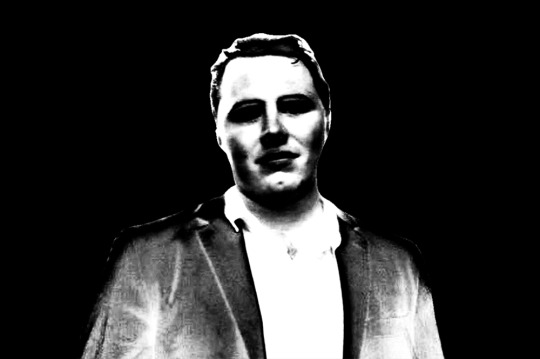
How would you describe your music?
It’s pop music, which is to say, it’s an attempt to bear witness to human suffering which does not presuppose an experiential gap between the instruments and victims of that suffering.
Your debut release Our Giant Panda is Not Pregnant released by Slow Dance just celebrated its first anniversary. Could you explain how that album came together?
A few years ago I found myself living in a friend’s garden shed for a few weeks. I couldn’t really sleep in there, so I just decided to stay up at night writing that EP using my phone, my laptop, and Audacity software. Later on Slow Dance decided to release it, for which I am very grateful, because it allowed me to stop tinkering with it and now I’m working on something new.
Often your music feels like it is ingrained with messages or ideas, are there any songs on Our Giant Panda that are especially interesting to you in terms of what they attempt to communicate?
Yes! I guess the whole thing has one message: “this is the story of a conversion”. We can view it like this: in logic, "No X is Y" is the converse of "No Y is X". So the conversion of the proposition “No material objects are sacred” to “Nothing sacred is a material object” is not representative of a religious conversion; we’ve just upcycled the absence of the sacred with respect for the immaterial situation of the sacred, and the victory gained by swapping that predicate and subject is pretty pyrrhic. That’s why I put Rachmaninoff’s setting of the Magnificat into “Introduction” and “The Assassination of…”, to signpost how this incarnation of something has to fail and flail in order to get conceived – to be acknowledged for what it is.
There is a rich versatility in your vocals across your music, ranging from powerful choral performances to theatrical rap and everything in-between. Do you consider your voice as a malleable element in your music?
Yes, everything, voice or computer or guitar or dignity, needs to be malleable in service of the music. I can’t change my voice; I was born with it and my entire body would have to change the way it sounds. So whether it’s voice or acoustic instruments or electronics, it’s about having lots of limitations, but total freedom within those limitations to keep hammering away.
You are in the process of finalising a monograph about Taylor Swift, could you explain what that’s about and how much her suddenly dropping Folklore presumably ruined your plans?
I think Taylor Swift’s music demonstrates a combination of thematic density and popular accessibility which hasn’t been seen in the English-speaking world since the plays of Shakespeare and Marlowe. My essay is an attempt to fight for interpretations of her music which are serious and avoid mystifying what she’s doing for fan service, or subjecting its readers to dry critical theory. I doubt folklore will be topped this year for the sheer craft of its songwriting, so I'm very glad it happened when it did. But yes, I do need to rewrite the whole thing this summer!
Who or what out there inspires James Martin?
At the moment I’m really into Lingua Ignota, Merlin Nova, clipping., Pharmakon, Bola de Nieve and Nadah el Shazly especially. But if I want to get more reliably inspired I tend to read rather than listen to music. So I’m currently making my way through Herrlichkeit by Hans Urs von Balthasar, and Susan Sontag’s diaries, which are amazing. I also like watching television shows where basically the same thing happens in every episode. Narrative arcs do not inspire me.
youtube
Words by Robert Davidson
0 notes
Text
SnK 90 Thoughts
Have you ever had this perfect story idea in mind, then realized that in order to get to it, you have to write basically an entirely separate book to set it up?
Have you ever decided that you really don’t feel like doing that?
Usually, that is when the words stop and the project goes into a desk drawer. Mostly a figurative one these days.
But--bear with me here--what if...
You just skipped all the boring parts.
There’s something delightful about watching Attack on Titan develop. Art and pacing have come so far since the first chapter, but you still get these glorious flashes where the reveal of our main character’s arch-nemeses is done with such a complete lack of fanfare that you’d be forgiven for thinking you were reading a fake scanlation even if you had the volume open in your hand.
Isayama knows how to craft a story. His telling, on the other hand, regularly spends its time stumbling up to the podium in its pajamas and happily shooting its laser pointer every whichway all over the pretty projections on the screen until you’ve started wondering more about the laser pointer’s battery life than whatever the lecturer was supposed to be saying.
The main reason you don’t want to wrap up a plot point that has been present since day one of your seven years of writing in two pages is because--
Well, presumably that stuff mattered? To the story?
Isayama’s decision to kill off most of the Paradis titans in two pages involves looking at those confused statements, and declaring, “No, not really.”
Authors do not typically do this.
Heck, most stories don’t even get to the point where they can look back at their starting premise (that has survived seven years) and inform the audience that the physical realities of that particular conflict aren’t relevant enough to be worth covering the conclusion extensively.
The story goes that humanity hides away in a cage from the inhuman monsters lurking outside--until they decide to rise and fight.
Those monsters turn out to be human.
We’re technically sticking to the same story we always have been.
We’re just now doing it without titans.
It’s like Isayama looked at his Eldian plot, and thought to himself, gee, this makes that titan problem kind of redundant, doesn’t it?
And the grand solution was to just write the common titans out of the story.
Because that is what you do with plot inconveniences. Naturally.
This is not how satisfying storytelling works.
It is hilarious, and the time frame on dealing with the worldly issues portion of this has adopted a scale that can probably handle it better, and there are a number of things that a time skip can make interesting--but holy fuck how long is that laser pointer’s battery life.
I’m going to harp on about this a little longer than I need to (shocking, I know), because as someone who tries really, really hard to get pacing right, this whole process is incredibly fascinating.
Having introduced the rest of the world to this tiny stage, this one plot detail, it of titanic proportions, it that has guided so much of the story, is so irrelevant to where the story is going that it can be excised in two pages.
That is extraordinary to me.
I don’t think I have ever seen such a prime example of an author recognizing that a prominent plot line has outlived its usefulness. It’s like he went full-on original flavor Vader.
Obviously, ideally, the Eldians vs. The World plot would tie into the common titan problem of Paradis, and the story would be allowed to proceed on both fronts. Doing it smoothly would be a challenge, but that’s writing for you.
Just as obviously, that’s not happening.
In a perverse way, the first 80-some chapters of this series behave like one of those windup toys. We didn’t know why Eren could transform into a Titan. We didn’t know why the titans attacked. We didn’t know anything about society outside the walls. We didn’t know what was in the basement. We didn’t know how the walls came to be. We didn’t know who the real enemy was. Our heroes were isolated in their struggles to rectify all of that.
We have now had our full orientation. We do not need the play-monsters anymore. We have the answers. All that’s left is to put the toy down and see how far it can go.
This is not what I would call good storytelling, but it’s so neat. I don’t think we would get to see this story with someone who was better at timing. Most people whose work is being published wouldn’t look at the series’ most well-known plot feature and put it up as collateral for the story they’re more interested in.
That kind of abandon is not something you usually get to see with a story of quality. You don’t just... gloss over parts of the story that matter. That’s common sense.
Offering the counterargument that those silly details were never meant to matter, when those silly details were formerly thought to be the plot?
That’s daring to suggest that there are parts of the story that are more worth spending time on. If the roaming titans of Paradis are deemed inconsequential, then what’ve you got for us?
It should be something good.
It should not, for instance, be forty minutes of the main character stuck in his own head until he breaks out and a bunch of people clap for him.
While I will continue laughing at the execution, one of the main reasons I’m okay with the time skip is because I’m still down for this story. This is still about humans fighting monsters for their right to breathe free air.
The difference now is that the training wheels are off.
And very promptly thrown into the sea.
It isn’t about mindless monsters eating people. It’s about human beings whose hatred and cowardice lead to them demonizing and abusing an entire race. This isn’t faceless cruelty anymore.
The fight is the same it always has been, but it’s now an informed fight.
So all that’s really great.
...Except then I get to thinking that people in the walls could actually maybe live outside the walls because the titans mostly vanished in two pages and my head starts spinning because who does that.
Never let it be said that this is a graceful story. Just a good one.
Speaking of gracelessness, this chapter was, in fact, longer than two pages.
And Floch exists.
Jean 2.0, featuring none of the insecurity that can pretend to be tact.
Floch’s role in this chapter is painful on multiple levels. He’s the sole survivor of a suicidal charge, and he did everything right. He saves his commanding officer. Humanity’s Commander. He takes them to the people who can save his life. He performs admirably even though he calls himself a coward and cannon fodder.
He’s another broken person, but the first one we’ve seen broken in part through our protagonists’ actions.
He tells the truth as he sees it, but he has no care for the damage he inflicts with it. He might find it important that Hitch get an unvarnished view of what Marlowe’s last charge is like, but he doesn’t offer emotional support. He might hate the decision Levi, Eren, and Mikasa contribute to, and think it deserves to be known, but Armin is the one he hurts, and Armin’s the only blameless party involved.
He lectures the rest of the 104th for what goes down, but Connie, Sasha, and Jean aren’t there for most of the exchange. They show up and have no clue what’s going on. Hell, Sasha’s unconscious during the rooftop discussion, and Connie’s carrying her. Jean’s the only one free, and by the time we know he’s there, Hange’s breaking up the fight.
Floch sits back and watches Mikasa pin Levi to the rooftop with a sword to his throat before he says a word.
He can be mad at Levi and Mikasa and Levi all he wants, but lashing out at Armin and the rest of the gang isn’t a matter of principle. He’s just hurt.
We don’t know enough about Floch to know how much of what he’s saying starts from a good place, but by the end of his sequence, it’s pretty obvious that his honesty, however powerful it is to hear, has its own bite of childishness.
It’s still sad, though. When Armin says Floch is right, Floch doesn’t look happy or victorious. Being right doesn’t change the mess they’re in or make the pain any less.
But geez. He manages to make half the people he talks to look like they’re questioning their will to live. Kid could use a kick to the shin and a hug.
The story has his back on making sure the words land, though. This chapter is a nostalgia trip and a half.
“In other words, you couldn’t throw away what was important to you, right?”
--to Armin
“But even a piece of fodder... should at least have the right to assess the situation!”
--and to Jean.
Yeah.
“Don’t get mad when you hear this... but Jean... you’re not a strong person... so you can really understand how weak people feel. [...] I mean... most humans are weak, including me.. but if I got an order from someone who saw things like I do... no matter how tough it was, I’d do my damnedest to carry it out.”
--Marco, 18
Marco never comes up in happy conversations.
My personal favorite goes to Mikasa, though. For maximum pain.
“You gave up in the end.”
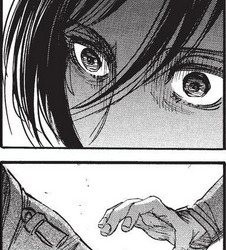
Hello, I am excite.
I’m not capping the whole thing because I adore these two panels on their own, but for the sake of full context, that hand of hers was holding Eren’s shoulder the moment before Floch’s words.
Hange convinces her to stop fighting for Armin on the roof.
Logic and history say she’s going to lose him and Eren.
Mikasa has spent such a long time refusing to give up. The first time the need to truly resonates, she stands and fights anyway.
She always fights. If you don’t fight, you don’t win. That’s what her first moments with Eren teach her.
Then there’s Floch, telling her that she’s more of an adult for giving up. Giving up on her family, accepting the loss.
She’s going to lose them. There’s nothing to fight here, and one of them is only alive now in spite of her, not because she was any help. There’s a hopelessness to Eren and Armin’s situation that won’t be denied, so what, is that the answer again?
Giving up on them?
Watching both of them die?
Mikasa could really use some proper pages dealing with all of the above, but for now I’m really psyched that the little moments are happening. She literally lets go of Eren in paralyzed horror.
Can has more? Please?
Besides making pitiful puppy eyes into the abyss, though, this chapter actually does have me really jazzed for whatever’s awaiting Mikasa.
The conflict that Floch keeps hammering away at is one that’s been lurking in the background for ages. Since the very first volume, to be precise. We’ve since seen in explored at length through Levi, Erwin, and the serum bowl, but like with many things in this manga, we start with Mikasa.
“Humanity is on the brink of extinction and you’re trying to dictate your own rules?!”
--Eren, 4
Mikasa’s devotion to her family has been a primary character feature since her introduction. Her development has rarely been highlighted, but constantly in the background and her moments of foreground, she wrestles with the conflict of being a loyal companion and an exquisite soldier. She’s conscious of her decisions and mistakes without letting them tear her to shreds, which is a claim very few characters can make.
When she leads the charge in Trost and neglects to be there for her comrades, she knows it. When she ignores Levi’s commands against the Female Titan, she sees the damage and carries the responsibility forward. She remembers failing to kill Reiner and Bertolt and guilts over it.
Responsibility is seldom actively neglected in this series. Otherwise I wouldn’t have such easy things to quote as an example of a character making a bad choice; if someone does something questionable, you can expect a dialogue bomb to reference it at some point.
But Mikasa learns. Her mistakes aren’t creating an ever-deeper fault of trauma for every new horrible thing to trigger. She’s taken some extraordinarily hard hits, and it’s left her fragile in places, but when she experiences a mistake, she tries her best to correct it for the future.
The easiest comparison to that is Erwin.
Quotes are fastest, so I’ll go ahead and do that with something I wrote a week ago: My view on his increase in personal goals is that his guilt for being less than what he should be turns into him overplaying his baser qualities. Instead of being a good man and leader who has a weakness to overcome, he tries to frame himself as a bad leader, freeing him up to indulge in the absolute worst of his selfishness.
I believe the phrase is go big or go home. Erwin sees his mistake of putting himself over humanity, and he overcompensates in the wrong direction.
When Mikasa’s mistakes happen, she continually progresses in a direction that offers solutions to her errors.
That might be why she ends up stuck on the sidelines more often than not. Someone who quietly observes and grows at a steady click, without having their world knocked down every other week, can be hard to portray dynamically outside of key moments.
Here’s what makes all of that the fun of the hour: Mikasa’s personal, at times obsessive, loyalty, rooted in trauma, is now clearly facing its losses against her own sense of honor and duty. As much as she loves Eren and Armin, protecting them at all costs has slowly turned to only most costs. There’s enough distance between her and her trauma that there’s room for her independent respect for the world is calling her out when she does something she shouldn’t.
Eren doesn’t have that.
Eren, the first loud voice we heard screaming about the worth of humanity, has found the persons he would give everything for, and he can’t step back. He can be ashamed of his conduct on the roof, but if the same situation were to happen again, the same desperation for his friend would still be there.
Eren’s been beaten down so many times that I think his ability to let go (already one of his weaker points, since he always fights to win) has up and left him.
He can’t lose his family.
He can’t regret that Armin’s the one alive, and he refuses to put Historia in danger.
Back when Jean first joins the Survey Corps, he voices his criticisms plainly, and makes sure everyone around him knows the stakes.
“Look, Mikasa... not everybody is like you... We’re not all volunteering to die for Eren. All of us, Eren included, should know... what our lives are going to be used for.”
--Jean, 22
It isn’t about just one person. It’s about the bigger picture. It’s about fighting for the sake of humanity. It’s about humanity.
It’s supposed to be.
But Ymir will give up her life and freedom to save the girl she loves, and then two random schmucks she can’t make herself leave. The pinnacle of Historia’s arc has her placing one life she cares about over plenty of others. Erwin will forget humanity for his dreams until his closest companion corrects him--only to fall into a similar trap because he can’t face sacrificing Erwin.
Grisha gives everything to his cause, but because he doesn’t love his son, he fails.
Reiner, Bertolt, and Annie are never in sync, and they die alone.
So what’s going to end up winning?
No one life is worth more than the rest of humanity, but if you don’t fight, you can’t win. If you sacrifice your interpersonal bonds for a grander purpose, you’ll never make it, because you’ll be fighting on your own.
Right now, the healthiest balance goes to Mikasa and Hange. They love fiercely, and will protect what they value with all of their strength, but their responsibility to the rest of humanity means too much to risk being selfish. Some sacrifices have to be made. Sometimes you have to let go.
But not until the very last second.
Hange understands all of that, and is grown up enough that it all flows.
Mikasa is still wrestling with how deeply that goes against how she’s fought for her family for years.
Eren, meanwhile...
I think it’s fair to say Eren is a fucking mess?
Eren, as he starts out, is idealistic, passionate, and naive enough to believe that you can change the world by running down that road at full speed.
As Eren is right now, I think he holds the memory of that being the way things should be, but he’s so bogged down in everything that’s happened, he’s lost the original spark that keeps that flash of optimism functioning.
When he talks about the ocean, he can bring Armin back, but he can’t bring himself back. His aunt’s mangled corpse is more real to him than the dreams he had as a child.
Mikasa and Armin make it to the beach, and despite all of the pain they’ve gone through getting there, they can smile. They can squeal over the tide over their feet. They’re happy.
But for Eren, the ocean that has always been one of the solid carrots of his struggle has turned into a reminder that they’re still not free. They’re still stuck. They’re still surrounded by monsters. It never ends. Making happy dreams come true is a temporary flight of fancy that can’t save them.
Death, though. That can fix it, right? Just... kill them all.
I don’t think the bleakness of RAB’s perspective has ever been presented so quietly.
Eren has fallen to a place that dreams can’t reach, and his only answer to that sense of desolation is to turn it on their enemies.
When the choice between Armin and Erwin is presented, Eren’s strongest argument for Armin is that he can still dream. He isn’t consumed by revenge. He sees something outside of death and chaos when Eren can’t.
After another year of life, that difference has only expanded, and now Eren really can’t find anything to hope for.
And that’s essentially why there are those few paragraphs of theme up there. Becoming a slave to a cause and abandoning softer things is dangerous. There needs to be that balance that people like Hange have, otherwise you’re just going to fall apart.
Learning to let something go is valuable, but if it’s done because it hurts too much to hold it close, it isn’t growth. It’s destruction. That’s why Mikasa’s struggles, while agonizing, don’t separate her from joy the way Eren’s have.
Mikasa’s learning that there are some things you can’t fight. Eren’s found despair in thinking victory can’t exist.
And look, I’m an optimist with this series. I know that, and I know it’s probably annoying or laughable on occasion.
But that setup is so perfectly arranged to oppose the themes presented in their first meeting that I can’t help but hope they’re going to go through all of this, losing faith in beliefs that have sustained them for years, and then find them again.
They aren’t young children anymore. Idealism is hard, and their lives have only made it harder, but that’s what makes it matter so much. Their values don’t deserve to lose, and if they don’t champion them, no one will. And I’d kill to see them find their way to believing in that again after being through hell.
With that thoroughly rambled about, we turn to things I don’t have complete thoughts on, but will bring up regardless.
Starting with the fact that Marlowe’s name variances would drive me to drink if I drank.
Eren pretty fragrantly calls back to what Levi tells him in the forest when they’re first facing the Female Titan.
“I don’t know the answer. I never have. Whether you trust in your own strength... or trust in the choices made by reliable comrades. No one knows what the outcome will be. So, as much as you can... choose whatever you’ll regret the least.”
--Levi, 25
“I don’t know... what the right choice is. How can anyone know the future?”
When Levi says it, it’s a call to action. Who knows what the right choice is, but you’ve got to make one. When Eren says it, it’s an attempt at comfort. A choice has been made, so let’s work with it and not fuss too much over how, yeah?
Besides, Armin is so unbelievably amazing that regrets are even more of a waste than usual. For sure.
And the last thing I can work myself up to care about is that Historia rocks, and I’m gladdened that she instructs her people to not be such lying jackasses without hesitation. Hail to the Queen and etc.
But when Eren has his more complete flashback to the incident between his family and the Reiss family (harking a return to feeling slightly bad for Grisha--whatever his mistakes, Eren, Carla, and Mikasa are his world, and that’s a worthy perspective), what I really want to know is if Historia sees it too. They’ve experienced mutual memory magic before, but that was in the cave of mysteries.
Mikasa and Armin seem to notice that something has happened, but Historia’s the one to get the large panel of her eye (I need a tag for her eyes still), and I’m dying to know if that’s because she’s the one looking at Eren’s expression head-on, or because she sees what he sees.
Because if she’s receiving flashes of his flashbacks when they’re connected, Eren’s attempts to protect her by keeping one of her potential uses a secret is possibly already long dead when they hit the beach.
Also it would make my favorite character maybe relevant for another arc.
I deserve nice things, this should happen.
#Shingeki no Kyojin#SnK 90#Mikasa Ackerman#Eren Yeager#shingeki no spoilers#SnK spoilers#spoilers#tl;dr#chapter post
299 notes
·
View notes